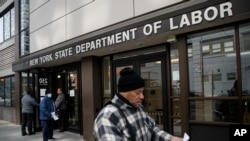A record 6.65 million U.S workers filed for unemployment compensation last week as businesses large and small shut their doors in the face of the coronavirus pandemic, the U.S. Labor Department reported Thursday.
The new figure pushed the three-week total to more than 10 million workers looking for financial assistance, with millions more laid-off employees expected to file claims in the coming weeks as the virus exacts a severe toll on the U.S. economy.
More U.S. workers have now filed for benefits in the last two weeks than during the first six months of the steep recession in 2008.
Some U.S. economists are predicting that 25 million to 40 million workers out of the U.S. labor force of nearly 165 million could be laid off by July, with the world’s largest economy plunging into a recession in the April-to-June period.
The wave of claims by the newly unemployed has overwhelmed some state agencies that handle the paperwork, with the jobless workers forced to wait hours in line at offices or online if they were filing electronically. Jobless claim websites in some states, including New York and Oregon, have crashed in the wave of claims.
The latest jobless claims total for last week were double the previous week’s 3.3 million figure, with both weeks easily surpassing the one-time U.S. record of 695,000 in 1982 as the U.S. battled high inflation at the time.
The western state of California, the Pacific coastal state that is the country’s most populous, led the way with 879,000 jobless claims last week, followed by Pennsylvania in the eastern U.S. with 406,000 and neighboring New York with 366,000.
On Friday, the U.S. government will report its new jobless rate. While it is expected to increase from the 3.5% figure that has held more or less steady for the last six months, it almost certainly will be a misleading figure since the government’s survey of employment covered early March before the biggest rounds of layoffs and business closures.
Retail stores, restaurants, gyms and the travel industry have been especially slammed by the coronavirus, but layoffs are also increasing in manufacturing, warehousing, transportation and some white-collar professions.
An estimated 190,000 stores have closed, about half of the country’s retail space. On Monday alone, major retailers Macy’s, Kohl’s and Gap announced that collectively they have laid off 290,000 workers. Other retailers have subsequently furloughed thousands more.
On Tuesday, investment banker Goldman Sachs Group forecast a far steeper economic decline in the U.S. than it had previously, predicting that output of goods and services would plunge by an annualized 34% in the April-to-June period, compared to its earlier estimate of 24%.
Goldman Sachs economists said the U.S. jobless rate would soar to 15% by mid-year, an estimate that would leave 25 million workers unemployed. Its earlier estimate was for a 9% jobless rate. Other economists have predicted even steeper layoff totals.
James Bullard, president of the Federal Reserve Bank of St. Louis, Missouri, predicted the unemployment rate may climb to 30% in the second quarter because of the business shutdowns, with a plunging 50% drop in the gross domestic product.
Last week’s jobless benefit claims are a likely indicator of millions more to come as many businesses are reassessing their plans by the day. They are faced with the question of whether to continue to pay employees when they have little or no work to do as would-be customers stay home under state government edicts that cover 87% of the U.S. population of 327 million to avoid public contact with others who might have contracted the virus.
President Donald Trump, however, has declined to impose a nationwide stay-at-home edict, saying that the impact of the coronavirus has varied by region in the U.S. and that individual state governors can best make decisions whether to order people to stay home.
Trump has extended recommendations for Americans to socially distance themselves from others by at least two meters through the end of April.
Normally, laid-off workers claiming unemployment compensation are paid a fraction of their regular salaries, a sort of stop-gap personal funding.
But the massive $2 trillion coronavirus rescue package that Trump signed into law last Friday includes $250 billion for bigger jobless payments that will benefit the newly unemployed at a time when the U.S. economy is facing unparalleled challenges.
The law extends jobless insurance from 26 to 39 weeks and increases the payouts to the jobless by $600 a week for four months above what states would normally pay the unemployed.
In addition, for the first time, freelancers and gig workers, such as Uber drivers, will be eligible.




